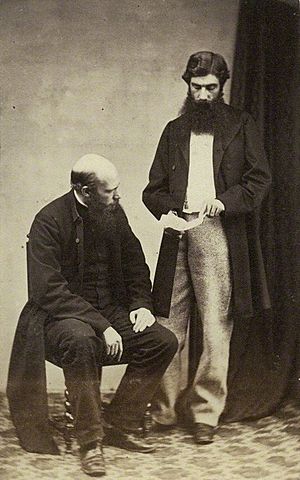Horace Waller (activist) facts for kids
Horace Waller (1833–1896) was an English activist, missionary, and clergyman. He worked hard to end the slave trade and was known for his writings about Africa. Waller was a strong Christian and worked closely with famous explorers like David Livingstone. He also supported Britain's expansion in Africa.
Early Life and Missionary Work
Horace Waller was born in London, England, in 1833. He went to school at Brook Green. For a while, he worked in London as a stockbroker, dealing with shares and investments.
In 1861, Waller joined the Universities' Mission to Central Africa (UMCA). He traveled to parts of Africa that David Livingstone and Sir John Kirk had recently explored. He worked with Charles Frederick Mackenzie, who was a bishop in Central Africa. Waller also joined Livingstone on his journeys near the Zambesi River and in the Shire Highlands.
After Bishop Mackenzie died in 1862, Waller returned to England. In 1867, he became a clergyman in Chatham. Later, he moved to Leytonstone, Essex, in 1870, and then to Twywell, Northamptonshire, in 1874. He left this position in 1895.
Fighting the Slave Trade
One of the most important goals of Waller's life was to stop the slave trade. In 1867, he attended a conference in Paris held by the British and Foreign Anti-Slavery Society. By 1870, he became a member of this society's main committee.
In 1871, the British Parliament formed a committee to investigate the East African slave trade. Waller and Edmund Murge strongly suggested that Sir John Kirk should become a permanent political agent in Zanzibar. This led to a treaty between the Sultan of Zanzibar and Great Britain. This treaty made the slave trade by sea illegal.
Waller was also friends with General Charles George Gordon. He became a member of the Royal Geographical Society in 1864. Horace Waller passed away in East Liss, Hampshire, on February 22, 1896. He was buried at Milland church on February 26.
Published Works
After explorer Henry Morton Stanley found David Livingstone in Africa, Livingstone's personal journals were given to Horace Waller to publish. These journals were released in two volumes in 1874. They were titled The Last Journals of David Livingstone in Central Africa, from 1865 until his death.
Waller's version of the journals presented Livingstone as a very saintly person. The main message of the book was against slavery. Some people have said that Waller's editing was "well-intentioned" but made Livingstone seem too perfect. In 1891, Sir Harry Johnston criticized Waller for not showing enough interest in other parts of Livingstone's work and papers.
Waller also wrote several other books and articles, including:
- On some African Entanglements of Great Britain, 1888.
- Nyassaland: Great Britain's Case against Portugal, 1890.
- Ivory, Apes, and Peacocks: an African Contemplation, 1891.
- Health Hints for Central Africa, 1893 (this book had five editions).
- The Case of our Zanzibar Slaves: why not liberate them?, 1896.


